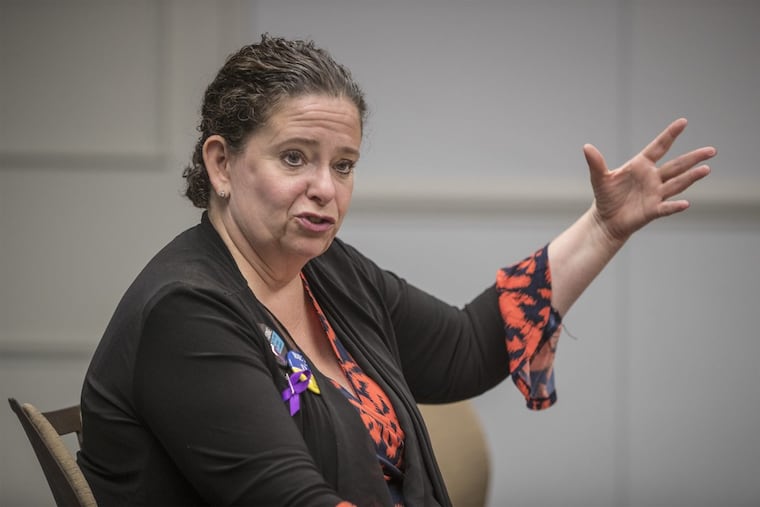Grossman cites experience in bid for Philly DA
Beth Grossman left the Philadelphia District Attorney's Office in 2015 after 21 years, disgusted with how the agency was being run. Now she's the Republican nominee to be the city's next chief law enforcement officer.

Beth Grossman found herself surrounded.
The lone Republican candidate for Philadelphia district attorney, she had no one to debate before the May primaries, so she was invited to candidate forums with the seven Democrats.
It turned out her positions didn't deviate too much from theirs.
"You follow the law," said Grossman, who will face Democratic nominee Larry Krasner in the Nov. 7 general election. "This is a political race for a nonpolitical office."
On paper at least, Grossman, 49, represents the best chance for Republicans to win the city's top law enforcement post since 1985, when Ronald D. Castille was elected. Her opponent is a progressive defense attorney with no time as a prosecutor, at odds with the city's police union. Liberal billionaire George Soros spent $1.4 million to boost Krasner.
RELATED: Civil rights attorney Larry Krasner – DA's Office is 'off the rails'
Grossman said she never expected to run for the office where she spent 21 years as an assistant. Blame that on Seth Williams, a onetime boss, who will be sentenced Oct. 24 after pleading guilty to a federal count of bribery.
After moving to the Department of Licenses and Inspections in 2015, Grossman entered the race in January, itching to take on Williams. Her slogan: "Beth, not Seth."
Williams, a Democrat, was still seeking a third term, but dropped out in February and was indicted in March.
Philadelphia political corruption made Grossman a Republican, she said. She left the Democrats in 2013, returned in 2015 and went back to the GOP last year.
Though she said she was fed up with the way Williams operated, Grossman allowed that he made improvements. She praised his use of diversionary programs for nonviolent offenders and a move to assign the trial division geographically, putting prosecutors closer to neighborhoods.
In terms of style, however, Grossman would likely return the office to how it was run for 18 years by her mentor, Lynne M. Abraham, a Democrat who has given Grossman $500.
Abraham described her as "dedicated to the office and easy to get along with." As a veteran of the city's political scene, Grossman's former boss also knows how tough it is to run as a Republican.
"Anyone who says it's easy is a fool," Abraham said.
Grossman breaks with Abraham on one issue — she "didn't particularly like it" when the former district attorney punted political cases to other agencies, citing potential conflicts. She pledged to pursue public corruption herself.
She also said Williams allowed the office to become "management-heavy" and plans to review assignments.
Krasner, a defense attorney for three decades, is best known for suing the Philadelphia Police Department and representing protesters in civil rights cases. "This is not a learn-on-the-job experience," Grossman said.
Lodge 5 of the Fraternal Order of Police has endorsed Grossman, though she has said she will prosecute officers for misconduct.
"I have investigated and prosecuted police officers. I have no problem doing that," she said.
Asked for an example, Grossman cited the 2004 case of a 39-year-old officer who pleaded no contest to charges for an inappropriate relationship with a 15-year-old at Roxborough High School, where he patrolled. The cop was sentenced to house arrest and probation.
Grossman, speaking to a group of GOP students at Temple University's School of Law Wednesday, said the local party is "staid and stale" but she hopes they will help reinvigorate it.
Grossman's most recent campaign finance report shows little support so far from the party.
She had just $5,643 in the bank and $26,886 in debt as of Sept. 18, hardly enough in a city where Democrats outnumber Republicans 7-1. The bulk of her debt was a loan she made to her campaign.
Grossman described herself as a "centrist Republican" and Krasner as a "far-far-far-left Democrat."
With a salty sense of humor, Grossman predicted that she'd have her "ass handed to me" if any of the six Democrats who lost to Krasner were running. Five had been prosecutors. One was a judge.
That, she said, gives her a chance.
Grossman grew up in Northeast Philadelphia and Huntingdon Valley. Her father ran a candy store in Kensington, under the El tracks. Her mother was a teacher who took time off to run it after Grossman's father died.
She graduated from Pennsylvania State University with a degree in political science before earning a law degree at Temple, and interned with the U.S. Attorney's Office and the District Attorney's Office.
Elois Howard, who supervised Grossman when she worked in special investigations and narcotics, recalls a prosecutor who could navigate conflicts while others might seek "the spotlight" of combat.
"She's calm. She's thoughtful. And this may be a killer, but she's kind," Howard said.
Grossman now pitches a potential political liability as proof that she has the capacity to run the office: experience using civil-asset forfeiture as chief of the Public Nuisance Task Force.
That process allows authorities to seize homes and businesses thought to be connected to crimes like drug dealing without the higher bar of proof required in criminal cases.
The tactic prompted a 2014 federal class action lawsuit against the city, which in June proposed a voluntary permanent ban on using civil-asset forfeiture proceeds to fund law enforcement. Instead, they can be used only for programs like drug-abuse prevention and treatment.
"I reviewed every case," she said. "I didn't abuse the law."
Grossman said she attended hundreds of community meetings, where she met people who could not sit on their porches or let their children play outside because of crime-ridden neighboring properties.
That experience gave her working relationships with other city agencies, civic groups and business organizations, connections she said would help her as DA.